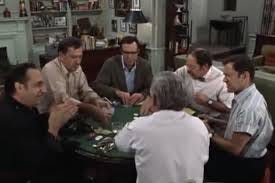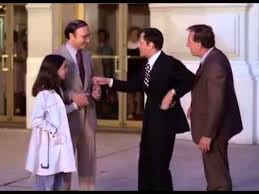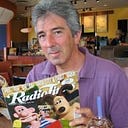Fifty Years of The Odd Couple on TV (Part 2)

Considering the enormous success The Odd Couple enjoyed onstage and on film in the late 1960s (as discussed in Part 1), it was inevitable that the play would further extend its life on television. Garry Marshall explained how he and writing partner Jerry Belson became involved:
“Paramount studios, who we had worked for on and off, decided to do The Odd Couple. Neil Simon didn’t have a good deal with Paramount, because they kept the television rights. So he didn’t want to do it, otherwise he would have wrote it himself. So they hired us to write the television version. ..We wrote as close to Neil as we could. And I remember handing in the script of the original pilot, and they said, ‘Well, this is what Neil Simon writes. This sounds like he wrote it.’ And we said, “that wasn’t the point? You want another version of what he wrote?’ And then somebody [of higher rank] than that person said, “No, no, that’s what we want. They didn’t steal it, they just made that same writing pattern.’ Neil had a certain pattern. We studied it. We went and saw The Odd Couple — everybody’s version.”
At the time, Marshall and Belson were fairly new to television, yet were suddenly given the responsibility to make the series a success. “I went to work everyday of the first season scared to death. My title was ‘Executive Producer’ (which today is known as the “show runner”) and I desperately wanted to do a good job. Unfortunately, I didn’t even know what a ‘good job’ looked like…”
When it came time to cast the series, “I was very clear about my choice of Tony and Jack,” Marshall said. “The final decision came after a few potentially disastrous casting considerations such as Mickey Rooney in the part of Oscar and Dean Martin as Felix. But from the moment I envisioned Jack and Tony in the parts, there was never a second thought.”

By this time, Randall, like Klugman, was no stranger to playing the co-lead of the play. “I had played The Odd Couple,” Randall said. “I’d first done it at Caesar’s Palace in Vegas with Mickey Rooney. We had a big success with it. And then subsequently I played it in Chicago for two summers, with an actor named Tony Mochas — once 8 weeks, once 7 weeks. And Garry Marshall came to me during the second run and asked me to make the series.”
Randall was skeptical. “I didn’t believe it would be a success. I didn’t see how you could continue ‘clean & dirty’ jokes. I didn’t know how good Garry Marshall was. And Jerry Belson. But also, I did need the work. I had gone about a year without a movie. I was hungry. Well that proved to be the turning point of my life financially, because I owned a big piece of the show, and it continues to throw off profits…”
With Randall onboard, the producers still didn’t have an Oscar. “We were ready to shoot. We offered it to Jack, he didn’t want it. We offered it to almost every actor you could think of who would be right for it. No one wanted to do it. We were sitting in the office of an agent named Milton Goldman, and we were wracking our brains to think of who in the world could do it. We didn’t have anyone, and we were ready to shoot. And he said ‘I’ve got it! Shelley Winters!’ Finally, they convinced Jack to do it.”

As Klugman recalled, “When it came time to shoot the pilot for The Odd Couple series, Tony actually wanted Mickey Rooney to play the part of Oscar. He had done the play with Mickey in summer stock and they had also gotten great notices. Garry Marshall…wanted me to play the part and fought for me. I figured it was because he had seen me on Broadway when I replaced Walter Matthau. With Tony in [the TV series], I figured this had to be a class operation. Then I read the pilot and fell down. Up till then I’d rarely worked the same series twice. I have this big mouth, see; I’m not really respectful. On this show, nobody minds if you fight, argue, scream, I like that.”
“So, a few days into the first rehearsals, I thanked Garry and made a joke about how he must have caught me [onstage as Oscar]on a very good night. That’s when he said, in his low, slow Bronx accent, something that shocked me. ‘I never saw you play Oscar on Broadway…I saw you in Gypsy. You did a scene with Ethel Merman and I was impressed because as she was singing to you, she was spitting a lot and it was getting on your clothes and your face and in your eyes. You never even flinched. I said to myself, ‘Now that’s a good actor’. That’s how I got the biggest break of my career. Go figure.”
“His instinct is infallible,” Randall said of Klugman at the time. “He senses what’s wrong with a scene and knows how it can be fixed.”

The series premiered on Thursday, Sept. 24, 1970, on ABC. Interestingly, the program wasn’t the only Neil Simon-inspired series to premiere that night — and on the same network! A black cast version of Barefoot in the Park began its brief run (12 episodes) as the lead-in. Here’s the complete ABC lineup for that evening:
7:30 — Matt Lincoln (premiere episode) (starring Vince Edwards)
8:30 — Bewitched
9:00 — Barefoot in the Park
9:30 — The Odd Couple
10:00 — The Immortal (premiere episode)
Reviewing the debut episode in The New York Times, Jack Gould wrote:
“If only because of the felicitous casting of the irrepressible Jack Klugman as the sportswriter and Tony Randall as the photographer, the extension of ‘The Odd Couple’ at 9:30, appears to be a shoo-in. The writers and producers, Garry Marshall and Jerry Belson, successfully walked the fine chalk line between credible farce and Hollywood’s overdrawn antics…The TV version of The Odd Couple “hardly can be compared to the self-contained film and stage presentations, but on the home screen it has the merit of a twist, a notably desirable quality this season.”
As smoothly as the two leads worked together, the show was slow in attracting a viewing audience. Shot as a single-camera production (like a film), Randall and Klugman were even more disturbed by the laugh track added to each episode.

As Klugman explained, “We shot the first fifteen shows with one camera and the only good episode centered on and injured parrot that we thought was dead but was really just in a coma. In my opinion, the rest of them stunk. Apparently, the network agreed with me because after fifteen shows we were cancelled, with not much chance of even finishing the regular season.
“Feeling like we hadn’t been given a proper shot, we all lobbied the ABC executives, explaining that the show would never work with one camera. We told them that Tony and I were stage actors who loved the rehearsal process and knew how to use it. We said that if we switched from one camera set up to a three-camera set up they would be taking advantages of our strengths.
“You see, in a one camera world, you don’t get any rehearsal. Most of the time is spent setting up or breaking down shots and so it takes all week just to get the show in the can. But a three-camera world is another thing entirely. If the network would let us do things this way, it would give us all week to rehearse. Then on Friday, we could shoot the show straight through, in front a live audience, with real people and real laughter.
“We begged them to let us use the three-camera format, literally getting down on our knees to get rid of the damned laugh track. Oh, how we hated that canned laughter! It was an insult. Tony and I knew how to get real laughs! Tony even quoted Fred Allen to one of the execs about laugh tracks, ‘Do you realize how many of those people laughing are dead?’ ”
As Marshall recalled, “So, it went on the air, it was not a hit, but it was okay. And then Tony Randall went on The Tonight Show and he said, “We’re dying. We’ve got a great show but it has a laugh track; nobody likes the laugh track, it’s silly. Write to ABC, tell them to make us a 3-camera live [audience] show and we’ll do much better.”

The network aired an episode without a laugh track, which didn’t make anyone happier. But the mail response to Randall’s plea was tremendous. “Almost overnight,” Klugman said, “we created a furor, and by the end of the week, we had received more than three hundred thousand letters. The network got the point and let us finish the season with three cameras, a live audience, and no laugh track!”
The victory would have been more satisfying had the original author, Neil Simon, looked more favorably upon the idea of a TV version. Having no say in its writing or production, he tried to avoid it altogether.
“Neil Simon hated the show,” Marshall reported. “He said it never should be a TV show.” Actually, Simon’s problem was not so much with the quality of the writing, but the fact that he would not in any way reap the financial rewards of the series’ ultimate success (most of which would come later in syndication). As he wrote in his memoirs, “I never received one cent from the series. I had my name on every episode, but I never saw a dime, a nickel, or a penny. It ran for years and will run in syndication for years and years to come. Not just in America but all over the world. The value of what I had given up for The Odd Couple series was in the millions. Probably a great deal of millions.”
However, Simon blamed no one but himself — well, maybe his former business manager. “No one stole the money from me. No one forced me to make the deal. It was a judgment call, and I let the wrong person sway me in making that judgment.”
Once his daughter Ellen watched the show, she told him, “Ya know, Dad, it’s not a bad show. You ought to watch it once in a while.” Simon saw that it wasn’t really so bad, and contacted Marshall. “He called us and said, ‘I was mad at you guys, I don’t know who you are, but you did my show and it’s good.’ And he quoted lines, which is the best thing a writer could hear from another writer. He actually quoted lines. And we said, ‘well, can we meet? You wanna be on the show?’ ” His non-speaking cameo appearance with Ellen (filmed on location in New York) did indeed come to pass. “And he played himself, and we got to talk to him, and it was a great, great feeling.” In the scene, Felix recognizes Simon, and asks for an autograph, taking out his pen. After signing, Simon calmly walks away with the pen, unaware of Felix’s objections.

However, the series still struggled in the ratings. “One of the little-known facts about The Odd Couple,” Marshall said, “is that every year we were on the air, for all five seasons, we were cancelled in June and picked up again two months later in August.”
Klugman saw a silver lining behind the dark ratings cloud. “We had nowhere to go but up. And in some ways, Tony and I benefitted from the low ratings. After the second year our agent Abbey Greshler was able to renegotiate our contract and get Tony and me a legitimate piece of the show. ABC never thought it’d be worth anything and so they were overly generous. It turned out to be a very good thing for us. That ‘piece’ sent both of my kids to college.”
Randall and Klugman also broke new sitcom ground by insisting on taking part in the writing sessions, although they were met with some initial resistance. “You boys are done for the day, go home,” the writers would tell them, as they would begin a brainstorming session.
As Klugman recalled, “ ‘No, we said, ‘we want to be in on the writing.’ They laughed. ‘No, no fellas,’ they said. ‘You do the acting and we do the writing.’ They tried to dismiss us, but Tony was stern. ‘No!’ he insisted. ‘This is a collaborative effort. Jack And I have forty years of experience between us. We have a contribution to make and we intend to make it.’
“I just smiled and backed him up. At this point, they had no real choice. Tony could be a formidable adversary and they could tell he was ready to fight them on it. So, what could they do? The let us have a seat at the table. Eventually, the writers came to respect our input and, in the end, thought of us as an important part of the writing process…We wanted the humor to come from the character interactions sometimes, even when really funny lines were handed to us, we would protest.”
‘These are jokes, fellas! We don’t do jokes! Actors can’t play jokes. Actors play intentions. We have to make the relationships real first, or nothing will be believable or funny.’ ”

Despite consistently mediocre ratings, the creative team finally found themselves settling into a comfortable groove. “Now we had what we needed to give the show a fair shake and we all started having fun,” Klugman said, “not just Tony and me, but the writers and producers as well as the other actors were all energized by the live audience. By the end of the first season, The Odd Couple was a show with real legs.”
Klugman explained that even during the summer break between TV seasons, the duo remained firmly entrenched in The Odd Couple. “Each year we had a four-month hiatus and Tony and I would spend ten weeks of that time doing the play The Odd Couple. It was a great way to stay in shape for the television season and I am convinced it improved the work we did on the show.”
The series wasn’t perfect, however. Despite a fine supporting cast and plenty of snappy, Simon-esque one-liners, the storylines over time became increasingly contrived and silly, with many episodes veering way far afield from the original concept. Guest stars became more prevalent, including those with little or no acting experience — and it showed. Musical guests, allowed to sing or play a song in their familiar styles, would bring the comedy to a grinding halt, and for no logical reason.
Randall defended the need to often wander off-course with the show:
“You have to come up with a new script every week. You sit around a table and pitch ideas. I don’t know about other shows, but in this one Jack and I, the actors, participated in this, with Garry Marshall and Jerry Belson, and Harvey Miller. And they encouraged us to come up with ideas. ‘Whoever has an idea, let’s hear it!’ We did 114 shows. You need 114 ideas! In a very short time, you get desperate. And that’s when you start doing, ‘Well, Tony, you know a lot about opera, how about opera?’ Jack, horse racing, so that’s exactly right for Oscar Madison. And so we did show on opera and horseracing, and so forth.”

Throughout the series run, both actors were nominated for Emmy Awards each year, in the category Best Actor in a Comedy Series. Klugman won twice (in 1971 and 1973), and Randall won for his work in the final, 1975 season. In his acceptance speech at the Emmy ceremony shortly after the series was cancelled, he thanked the academy, closing with, “Now if I only had a job.”
Garry Marshall was pleased by how the series enriched not only his own life, but those of the stars as well: “During the five seasons of The Odd Couple, I wrote some of the episodes; I directed some of the episodes; and I produced them all. And one of my greatest pleasures was to watch Tony and Jack take a successful professional relationship and shape it into a deeply personal one.
“I was never happier than in this creative Camelot called The Odd Couple. I’d like to think that was true for Jack and Tony also. It’s very rare to have that kind of relationship on a television series.”
The ABC series may have come to an end, but there was still much more to come in the life of The Odd Couple — including two more revivals in sitcom form, and two more returns to Broadway. We’ll take a look at these in the third and final part of this story.
Until next time…
If you enjoyed this article, please click the “follow” button and follow me on Medium (no charge) for more articles on popular culture, music, films, television, entertainment history, and just plain old history.
You can also become a member in the Medium Partner Program to help support my writing. https://garryberman.medium.com/membership
Please visit my website, www.GarryBerman.com to read descriptions and reviews of my books, including For the First Time on Television, and order titles using the provided links to Amazon.com.
